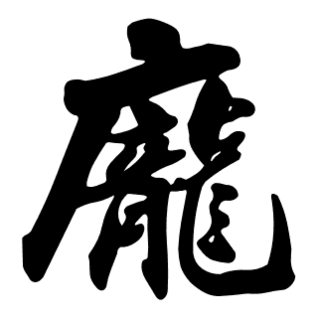Liu Wen may refer to:
- Liu Wen (model) (born 1988), Chinese model
- Liu Wen (doctor), one of the whistleblowers of the 2019-20 coronavirus outbreak
Liu Wen may refer to:

劉 / 刘 is a East Asian surname. pinyin: Liú in Mandarin Chinese, Lau4 in Cantonese. It is the family name of the Han dynasty emperors. The character 劉 originally meant 'kill', but is now used only as a surname. Today, it is the 4th most common surname in Mainland China as well as one of the most popular surnames in the world.

The Liu Song dynasty, also known as Former Song (前宋) or Southern Song (南朝宋), was the first of the four Southern Dynasties in China, succeeding the Eastern Jin and followed by the Southern Qi.

The Central Secretariat of the Chinese Communist Party, officially the Central Secretariat of the Communist Party of China, is a body serving the Politburo of the Chinese Communist Party and its Standing Committee. The secretariat is mainly responsible for carrying out routine operations of the Politburo and the coordination of organizations and stakeholders to achieve tasks as set out by the Politburo. It is empowered by the Politburo to make routine day-to-day decisions on issues of concern in accordance to the decisions of the Politburo, but it must consult the Politburo on substantive matters.

Emperor Wen of Han was the fifth emperor of the Han dynasty of ancient China. His personal name was Liu Heng (劉恆).
Taizu is an imperial temple name typically used for Chinese emperors who founded a particular dynasty. It may refer to:
Wen Ping, courtesy name Zhongye, was a military general who lived during the late Eastern Han dynasty and Three Kingdoms period of China. During his tenure as a general under the warlord Cao Cao, he was credited with defeating the enemy general Guan Yu and defending Cao Cao's interests in Jiangxia Commandery from the eastern warlord Sun Quan.

Emperor Wen of (Liu) Song, personal name Liu Yilong (劉義隆), courtesy name Che'er (車兒), was an emperor of the Chinese dynasty Liu Song. He was the third son of the dynastic founder Emperor Wu. After his father's death in 422, Liu Yilong's eldest brother Liu Yifu took the throne as Emperor Shao. In 424, a group of officials, believing Emperor Shao to be unfit to be emperor, deposed Emperor Shao and placed Liu Yilong on the throne as Emperor Wen.
Liu Xun is the name of:
Liu Bao was a Southern Xiongnu chanyu who lived during the late Eastern Han dynasty and Three Kingdoms period of China. His father was Yufuluo. His son, Liu Yuan, founded the Han Zhao state in the Sixteen Kingdoms era.
Liu Shao may refer to:
Emperor Wen, Wendi, or the Wen Emperor may refer to:
Qiuliju was a leader of the Wuhuan tribes in Liaoxi Commandery during the late Eastern Han dynasty of China. He had about 5,000 tribal clans under his rule.
文 is Kangxi radical. The Chinese character 文 wén means "literature" or "culture", and may also be a Chinese surname.

Pang is a Chinese surname. It is romanized Pong in Cantonese. In Vietnam, this surname is written in Quốc Ngữ as Bàng. "Pang" is also the Cantonese romanization of another Chinese surname Peng.

Liu Wen is a Chinese model. In 2012, The New York Times dubbed her "China’s first bona fide supermodel". She was the first Chinese model to walk the Victoria's Secret Fashion Show, the first East Asian spokesmodel for Estée Lauder cosmetics, and the first Asian model to ever make Forbes magazine's annual highest-paid models list. In 2017, Liu became the second Chinese model to ever appear on the cover of American Vogue, and the first to be featured on the front cover rather than foldout. She landed on the cover a second time in American Vogue's April 2020 issue, becoming the first person of Chinese descent to appear twice. She is currently represented by The Society Management and is based in New York City.

Constance Jablonski is a French model. In 2006, she entered the French Elite Model Look Contest. As of 2010, she became one of the newer faces of Estée Lauder alongside Liu Wen and Joan Smalls.

Xiao Wen Ju is a Chinese model. She was the first model of Chinese descent to be the face of Marc Jacobs.
Liu Heng may refer to:
Liu Wen-hsiung may refer to:
Wen Tian or Wentian or variation, may refer to: